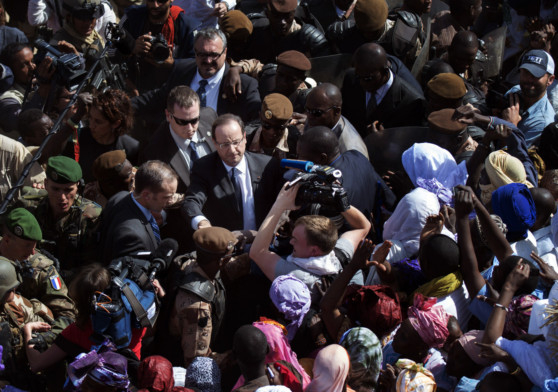
Timbuktu: French President Francois Hollande received a rapturous welcome on Saturday as he visited Mali to push for African troops to take over a French-led offensive that drove back Islamist rebels from the country’s desert north.
The French leader’s whirlwind tour came as troops worked to secure Kidal, the last bastion of radicals who seized control last year after a coup, raising fears that an area larger than France could become a safe haven for Al Qaida-linked fighters.
Welcoming Hollande, thousands of people gathered in the central square of the fabled city of Timbuktu, dancing to the beat of drums — a forbidden activity during the extremists’ ten-month occupation.
Hollande told the crowd France’s mission was not finished yet but that African countries would soon have to take over.
“We’ve already done a lot of work. It’s not over yet, it’s going to take several weeks, but our goal is to pass the baton,” he said.
“We have no intention to stay. Our African friends will be able to do the job we’ve been doing until now.”
Mali’s interim president Dioncounda Traore, who joined hands with Hollande and raised them in a victory salute, thanked his counterpart for the “efficiency” of the French troops, which he said had allowed the north to be freed from “barbarity and obscurantism”.
Hollande and Traore, who met in the central garrison town of Sevare before travelling to Timbuktu, visited the city’s 700-year-old mud mosque of Djingareyber and the Ahmad Baba library for ancient manuscripts, both targeted by destructive Islamist militants.
“There’s a real desire to annihilate. There’s nothing left,” Hollande told the mosque’s imam as they visited two ancient saints’ tombs that the extremists attacked with pickaxes in July, considering them heretical.
“We’re going to rebuild them, Mr President,” said Irina Bokova, the head of Unesco, which is trying to assess the scale of the damage to Mali’s ancient heritage.
Hollande, whose surprise decision to intervene in Mali three weeks ago made him a hero in the former French colony, was greeted with cheers of “Long live France! Long live Hollande!”
Meanwhile, the United Nations expressed alarm on Friday over reported mob lynchings and other reprisal killings of Tuaregs and Arabs as the Malian army retakes control of the north of the country.
Adama Dieng, a special adviser to UN leader Ban Ki-moon on the prevention of genocide, said there have been “serious allegations” of summary executions by the Malian army, which could amount to “atrocity crimes.”
French forces intervened in Mali three weeks ago to halt an Islamist advance on the capital and, with the Malian army, have taken back large chunks of territory from the militant groups.
The Islamists have already been accused of brutal killings and dismemberments as they imposed their version of sharia during their nine months in control.
The International Committee of the Red Cross has sought access to prisoners taken by the Malian army and the Human Rights Watch and Amnesty International groups have demanded an inquiry into reports of reprisal killings.
“While the liberation of towns once under the control of the rebel and extremist groups has brought hope to the populations of northern Mali, I am deeply concerned at the risk of reprisal attacks against ethnic Tuareg and Arab civilians,” Dieng said in a statement.
“There have been serious allegations of human rights violations committed by the Malian army, including summary executions and disappearances, in Sevare, Mopti, Niono and other towns close to the areas where fighting has occurred,” he added.
“There have also been reports of incidents of mob lynching and looting of properties belonging to Arab and Tuareg communities. These communities are reportedly being accused of supporting armed groups, based simply on their ethnic affiliation.”
The special envoy said the Malian army has a “responsibility to protect all populations, irrespective of their race or ethnicity.”
“I am deeply disturbed by reports of violations committed by the army, and by reports that the armed forces have been recruiting and arming proxy militia groups to instigate attacks against particular ethnic and national groups in northern Mali.”
The envoy added that targeting “ethnic or religious groups in an armed conflict and if such abuses are carried out in a widespread and systematic way, could constitute atrocity crimes.”
The International Criminal Court has said it will open an investigation into events in Mali.












